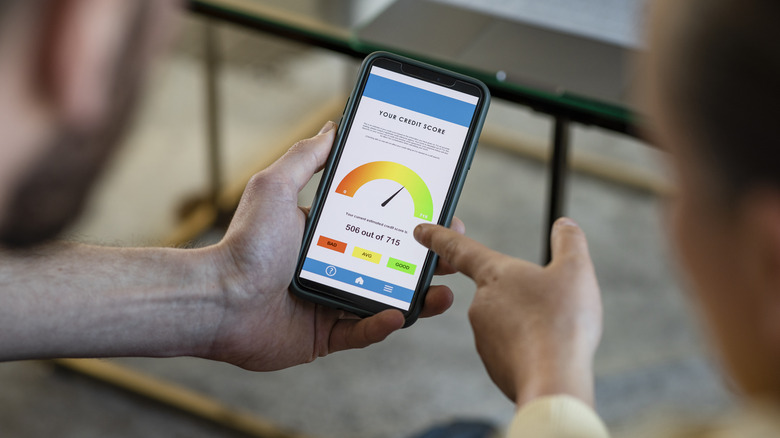If You Miss A Monthly Credit Card Payment, Here's What Happens
Despite our best intentions, sometimes our finances can get away from us. This is increasingly more likely given current interest rates and inflation. Not only are many workers not feeling that their wages are outpacing inflation, but increased housing and transportation costs are also contributing to just how many Americans are feeling financially strained.
This strain has ultimately pushed many to rely more heavily on credit cards than ever before. In fact, the country's credit card debt topped $1 trillion for the first time in history in 2023 while credit card balances in the U.S. have risen $175 billion since the end of 2021. This gives a startling indication of just how troubled many Americans are financially. Of the many potential downsides associated with ever-increasing credit card balances, perhaps none is as detrimental or has as long lasting of an impact as when someone misses their monthly payment altogether.
The national average credit card debt (with unpaid balances) was $7,279 in December 2022, while the state with the highest average credit card debt, Connecticut, averaged $9,408 (via LendingTree). This, coupled with the 2023 average credit card interest rate of 22.84% can mean serious trouble for credit card users who miss their payments. While paying back the missed amount can be difficult enough already, the added interest, fees, and credit score damage associated with a missed credit card payment can make financial recovery even more difficult.
Fees and APR
The first thing customers will face when missing a credit card payment is a late fee. These fees can vary depending on your cardholder agreement, and the credit card issuer's policies. Legally, credit card companies can only charge certain amounts for late fees. For instance, a first-time late payment can only be charged a fee of up to $30, while a second late payment within six months escalates the fee to $41. Even though you can only be charged one late fee per monthly cycle, these charges can add up. With that in mind, the Consumer Financial Protection Bureau (CFPB) proposed changing these fees to $8 in early 2023. The CFPB estimates that credit card late fees amount to about $12 billion each year.
Missing a credit card payment can also lead to different APR impacts. It's important to remember that credit card companies charge APR interest per day, meaning your due amount grows every day past your due date. Also, depending on your terms, you may face a penalty APR. These APR rates are higher than your standard APR, and can not only affect your existing balance but also apply to future balances. By law, credit card companies must lower the APR rate on your outstanding balance back to your normal interest rate after six months of on-time payments, however, they can still continue to apply the higher penalty APR on any future purchases on your account. This means that missing even one payment can lead to long-term issues.
Credit score
Missed credit card payments can be reported to a credit bureau, which can negatively impact your overall credit score. It's important to remember that payment history is a significant portion of your score, and this history includes your payments to not just credit card balances but also retail store accounts, loans (including student), home equity loans, and mortgages. This means that, even if you are not able to pay off the full balance of your credit card statement, it is important to always at least pay the minimum amount by the due date. By paying the minimum you can ensure your credit history does not show a missed payment, which can have negative long-term effects on how lenders, utilities, landlords, and even cell phone companies see you as a potential customer.
Your credit utilization ratio is another significant factor in determining your credit score. This ratio is the percentage of your credit that you have used/spent compared to the total credit available to you. The relationship between these two is then presented as a percentage, which can help lenders see, at a glance, how someone is currently managing their debt. Most lenders prefer to see a credit utilization of under 30% and this can affect their willingness to work with you. If your missed credit card payments begin to pile up, you can easily exceed that 30% utilization ratio in a short period of time which can affect your ability to receive loans, mortgages, and even new credit cards.


